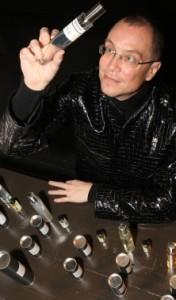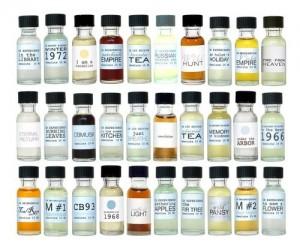Few have it, others envy it. Those who posses it can go mad. In a musicians world this is called "perfect pitch". Absolute Pitch, as defined by Wikipedia…is the ability of a person to identify or recreate a musical note without the benefit of an external reference.
The Perfumer's equivalent of Absolute Pitch is the "Natural Nose". In his own words Perfumer Christopher Brosius can "blend in my head as opposed to doing it in a flock of little bottles. "
Different he is. If I were to offer him a job I would retain him as a 16th century "cortigiane oneste", an Italian name for a well-educated and worldly intellectual entertainer of Kings and Princes, (and one who often held simultaneous careers as performers or artists). Why you may ask? It is Christopher's cutting wit that the Europeans love (and American's often fear) and the prickly excited feeling that if Christopher is going on a journey, then you want to go too. Which brings me to his perfumes…
Monica: One of the first thoughts that came to my mind when I first sniffed "A Room with A View" was the word "restraint" (in a good way). As a perfumer have you always had restraint, in terms of perfect harmony and proportion of ingredients/notes or is this something that you developed over time?
CB: I've always had that capacity. This is one of the key qualities that distinguishes a natural born "nose" from a trained perfumer. This isn't something I've always realized however. Michael Edwards pointed it out to me about 8 years after I'd begun making perfume. Over time however I have honed certain skills – for example I can now blend a perfume in far fewer variations than when I started. My first perfume that I offered for sale took 125 variations – now I can often do them in as little as 3. The amount of development time can be the same – it's just that now I blend in my head until it's reasonably close to what I want as opposed to doing it in a flock of little bottles. ….and mind you this is not to discredit trained perfumers in any way – they are just different and those of us who are born this way are a great deal rarer.
Monica: I noticed that in your profile you say that you do not like to cook. Is it because all of your creativity goes into inventing new perfumes?
CB: Hardly. Cooking is simply not my thing. I have many friends who enjoy cooking and find it relaxing. I find it messy and stressful. Also I hate spending hours preparing a dish that might be eaten in 15 minutes. I'd much rather spend my time doing other things. I can make really good soup though. That's like blending perfume – I just add things until it tastes right.
Monica: Is there a "natural" that you have not been able to find (to your satisfaction) that you wish a farmer would grow (and a distiller would extract) for your perfume palette?
CB: violet flower and lily of the valley. I know they'd be astronomically expensive but I think it would be worth it. I have no trouble paying upwards of $18,000 per kilo for narcissus absolute and though the flowers I mentioned could be a great deal more, I'd be willing. One of these days, when I have time, I'm going to go back to Grasse and see if there aren't still some of the old families who might still do a little of these now and then…
Monica: My products are made of purely natural ingredients but I am bi-curious about synthetics. Would you share your opinion on the subject?
CB: Not all naturals are good. Not all synthetics are bad. As with pretty much everything else, it all depends on quality and how they're used. I've run across "clever" little natural blends that contained frankly dangerous amounts of materials that should not be used generally in perfume – like wormwood. Or that contained improperly prepared materials like bergamot oil which can result in some fairly serious burns for some people. sadly oftentimes these are done by people with absolutely no clue as to how perfume is or should be made, appear to have done zero research on the subject and clearly have no respect at all for the process. I find that maddening. And of course there are endless amounts of entirely synthetic perfumes that I find perfectly revolting and absolutely obnoxious. And I can't say that I am at all in favor of synthetic- aroma chemicals containing molecules that "have never before been found in nature". If so, how can the human body – which is obviously a part of nature – be expected to process them adequately? And what might be the effects of long term exposure to such unnatural substances….? These I stay away from.
Monica: If you could time travel which period in history and which destination would draw you to explore?
CB: I think there are too many to choose from. Paris in the 50's might be interesting, I'm not sure. Anyway I'm fairly happy in the present.
Monica: As a child did you ever "steal" anything just for it's scent?
CB: No, I never did. As a child I wasn't terribly interested in the way things smelled. Strangely however, the memories of a lot of things from that period stuck in my head in an extremely uncanny way…
Monica: What thoughts do you have on the future of perfume?
CB: You know, I'm afraid I really couldn't care less. Perfume as a general concept has always bored or irritated me and I find it terribly depressing to see the same thing in the "industry" again and again and again and well you get the point. I can say that I hope there will be a lot less of it.
Monica: I agree. I hope more people will demand quality over quantity and treasure the smaller amount they have.
Christopher Brosius' Perfumes can be found at www.cbihateperfume.com
Disclosure: I have no financial interest in this business and bought my own samples.
–Monica “Skye” Miller, Natural Perfume & Senior Editor




